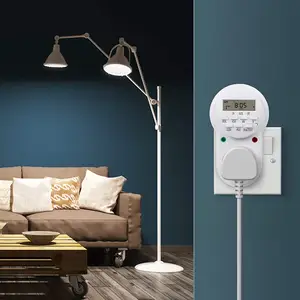(3836 products available)

















































































































































































7 days timer are an integral component within the realm of industrial controls. They are devices engineered to measure and regulate the passage of time, enabling precise control over various operations in industrial settings. These devices play a crucial role in automating processes, ensuring accuracy, and enhancing productivity. By managing the timing of specific actions, 7 days timer help in optimizing workflows, reducing manual intervention, and increasing efficiency across multiple applications. Their versatility and reliability make them indispensable in sectors ranging from manufacturing to utilities, where timing precision is paramount.
There is a diverse range of 7 days timer available to cater to different industrial requirements. These include digital timers, analog timers, programmable timers, and electromechanical timers. Digital timers are known for their precision and ease of programming, making them suitable for applications requiring high accuracy. Analog timers, on the other hand, offer simplicity and are often used in less complex applications. Programmable timers provide flexibility, allowing users to set multiple timing sequences, which is ideal for complex automation processes. Electromechanical timers are valued for their durability and reliability in harsh environments. Each type of 7 days timer is designed to meet specific operational demands, ensuring optimal functionality in its intended setting.
7 days timer offer a myriad of functions that are critical in industrial operations. They facilitate the scheduling of tasks by controlling the on/off cycles of machinery, lighting, and other equipment. This capability is essential in minimizing energy consumption and extending the lifespan of devices. Features such as delay and interval settings, countdown functions, and memory recall enhance the versatility of these timers. Additionally, certain models come equipped with LCD displays for easy monitoring and adjustment. The ability of 7 days timer to store multiple programs and operate under varying conditions further underscores their importance in streamlining industrial processes.
The construction and technical specifications of 7 days timer are tailored to meet the rigorous demands of industrial environments. Typically, these devices are designed to operate within a voltage range of 24V to 240V, accommodating various power sources. They may also offer a timing range from milliseconds to several days, depending on the application. Key components include relays, microcontrollers, and capacitors, which contribute to their precise timing capabilities. The housing of 7 days timer is often made from durable materials such as polycarbonate or stainless steel to withstand harsh conditions, ensuring longevity and reliability in industrial settings.
To maximize the benefits of 7 days timer in industrial applications, it is essential to understand their operational parameters and limitations. Selecting the appropriate type of timer based on the specific needs of the application is crucial. For instance, digital timers are ideal for applications requiring precision and programmability, whereas analog timers may suffice for simpler tasks. Proper installation and calibration of 7 days timer are vital to ensure accurate timing and seamless integration with existing systems. Regular maintenance, such as checking connections and updating software, can prolong the life of these devices and maintain their efficiency. Moreover, training personnel on the correct usage and programming of timers can significantly enhance operational productivity and safety.
When selecting 7 days timer for industrial applications, it's essential to consider the specific operational requirements and environmental conditions. The type of timer should be matched with the demands of the task, such as the need for precision, programmability, or durability. Digital timers are often preferred for their accuracy and ease of programming, while electromechanical timers are valued for their robustness in challenging environments. Additionally, the timing range, voltage compatibility, and ease of integration into existing systems are critical factors that influence the choice of 7 days timer . Understanding these aspects ensures that the timer can effectively support the intended industrial processes.
Several factors should be taken into account when selecting 7 days timer . The technical specifications, such as the voltage range and timing precision, must align with the operational needs. Consideration should also be given to the environment where the timer will be used, including exposure to dust, moisture, and temperature fluctuations. Timers with durable housings made from materials like stainless steel or polycarbonate can offer enhanced protection in harsh conditions. Furthermore, the ability to program and customize timing sequences can significantly impact the effectiveness of 7 days timer in complex automation tasks.
Timers improve automation efficiency by precisely controlling the timing of operations, thus reducing manual intervention and optimizing workflow. 7 days timer can automate the start and stop of machinery, lighting, and other equipment, ensuring tasks are completed on schedule and energy consumption is minimized.
For high-precision applications, digital 7 days timer are typically the most suitable due to their accuracy and programmability. These timers can be set to control operations with minute precision, making them ideal for tasks where timing accuracy is critical.
Yes, certain 7 days timer are designed to operate in extreme conditions. Electromechanical timers, for instance, are known for their durability and can function reliably in environments with high dust, moisture, or temperature variations. Selecting a timer with appropriate housing and protection features is crucial for such settings.
Regular maintenance of 7 days timer includes checking connections, ensuring proper calibration, and updating software, if applicable. Periodic inspections can help identify and rectify any issues, prolonging the life of the timer and maintaining its efficiency.
Programmable 7 days timer are indeed suitable for complex processes as they allow multiple timing sequences to be set and adjusted according to specific requirements. This flexibility makes them ideal for applications that demand customized timing solutions to optimize operations.